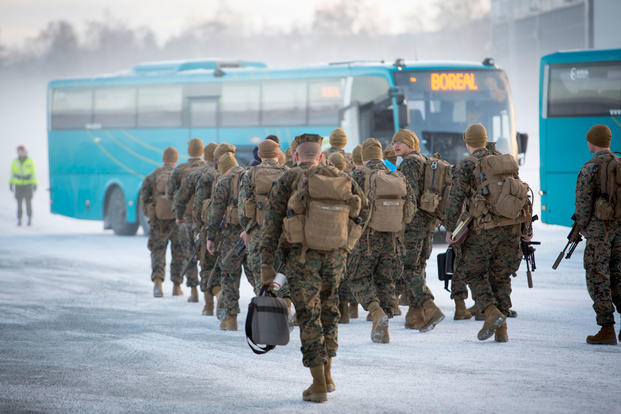Marine Leaders Highlight Norway Unit's Role as Deterrent to Russia
VAERNES GARRISON, Norway -- The stated goals of the Marine Corps' newest rotational force in Norway are to enhance partnerships with European allies and improve the service's ability to fight in cold weather.
But on a brief visit to the 300-member unit ahead of Christmas, the commandant and the sergeant major of the Marine Corps both described the strategic role the small unit fills -- and the fact that a peacetime mission can be preface to combat if circumstances change.
The Norwegian Home Guard base near Trondheim that houses the Marine rotational force was the first stop on Gen. Robert Neller's annual Christmas tour.
The stop was a new one for the tour. The first Norway rotation, from 1st Battalion, 2nd Marines, deployed in January and was replaced by a new unit from 2nd Battalion, 2nd Marines, in late August.
Neller emphasized to the Marines that they should remain ready to fight at all times, predicting a "big-ass fight" on the horizon.
"I hope I'm wrong, but there's a war coming," Neller said. " ... You're in a fight here, an informational fight, a political fight, by your presence."
Neller later told the Marines that he expects the Pacific and Russia to be the service's operational points of focus as the nation looks beyond the fights in the Middle East that have stretched into the better part of two decades.
The United States' position that Russia presents a major threat was re-emphasized in the new National Security Strategy released Monday. The document discusses Russia's practice of "using information tools" to interfere with other nations' democracies and militant aggression that crosses borders.
"With its invasions of Georgia and Ukraine, Russia demonstrates its willingness to violate the sovereignty of states in the region," the strategy states.
Sergeant Major of the Marine Corps Ronald Green put the Marines' role starkly.
"Just remember why you're here," he said. "They're watching. Just like you watch them, they watch you. We've got 300 Marines up here; we could go from 300 to 3,000 overnight. We could raise the bar."
The rotational force itself is much more circumspect about its role in the region. On a visit to the unit in May, Military.com found troops assigned to the unit had even been instructed not to use the word "Russia" in interviews with the media.
In large part, this is due to regional sensitivities.
The rotational unit is in Norway at the invitation of the Norwegian government, which maintains an economic relationship with Russia and shares a 120-mile border on its northeastern edge with the country.
While Norwegian feedback on the Marines' presence has been generally positive -- then-Norwegian Defense Minister Ina Eriksen Søreide announced in June that the rotation had been extended for a year, until 2018 -- others have cited misgivings.
In October, Norway opposition leaders asked Prime Minister Erna Solberg to explain exactly what the American troops are doing in the country.
Russian officials, for their part, have been outspoken in opposing the presence of Marines in Norway and warning of diplomatic repercussions.
Though Green did not name Russia, he referred to its displeasure at the Marines' presence nearby.
"They don't like the fact that we oppose them, and we like the fact that they don't like the fact that we oppose them," Green said. "Three hundred of us, surrounded by them, we've got them right where we wanted, right? We've done this before."
https://www.military.com/daily-news/2017/12/21/marine-leaders-highlight-norway-units-role-deterrent-russia.html

No comments:
Post a Comment